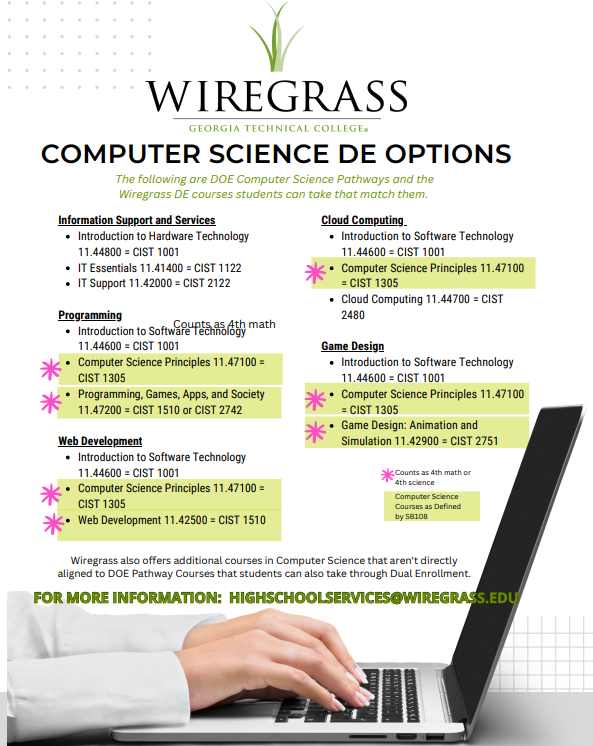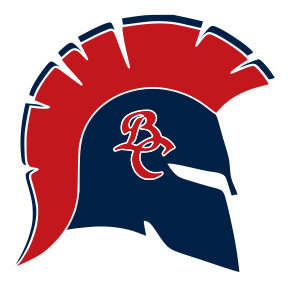CAREER CLUSTERS AND PATHWAYS
HIGH SCHOOL
Healthcare Science
CTSO: HOSA (Sponsor Mrs. Zinda McDaniel)
Teachers: Mrs. Zinda McDaniel
What It's About
Healthcare Science Technology Education programs are designed to provide students the opportunity to explore careers in healthcare. This course of study will provide students with a smooth transition into post-secondary nursing, medical or allied health education or the ability to acquire an entry level medical position in the workforce or the military. Students are exposed to general healthcare knowledge and skills and are then encouraged to pursue a more in depth study in the career area they are interested in through the appropriate career pathway. The pathways that are currently available in the healthcare program of study include: Therapeutic Services - Nursing and Allied Health Services.
In the program, a strong emphasis is placed on academic integration into the curriculum as well as the necessary foundation skills such as problem solving, teamwork, and critical thinking which are necessary to enter the workforce.
HOSA is offered through the healthcare programs and is a co-curricular component that compliments the classroom experience along with work based learning opportunities. Employment in the healthcare industry will provide students with a financially stable and rewarding career of service to others.
Career Pathways
Therapeutic Services – Nursing Dual Enrollment (CNA)
Therapeutic Services – Allied Health and Medicine
Computer Science
Teachers: Dual Enrollment Wiregrass Technical College

Culinary Arts Dual Enrollment
Teacher: WGTC Instructor (Chef Acree)
What It's About
Culinary Arts is a growing program in our schools across Georgia. This program is designed for those wanting to learn the “art” of cooking and for those wanting to continue in the Arts field in any of the many diverse opportunities: Sous Chef, Pastry Chef, Kitchen manager, Banquet Chef, or a Restaurant Entrepreneur.
Why It's Important
Opportunities in the culinary field are high in demand, wages and skills. Individuals in this field gain knowledge in diet, nutrition, food preparation, cost and budgets, and the science of food. As society looks for more convenience, this increases the demand of dining establishments and skillful individuals to work there.
Career Pathway
Culinary Arts
Start Up Entrepreneurship
CTSO: FBLA (Sponsor Mrs. Shelley Snow)
Teacher: Mrs. Shelley Snow
Purpose
Upon completion of this pathway, students should have their entrepreneurial venture ready to start and some may already be in business. With so many opportunities for students to become Entrepreneurs the pathway offers three courses to prepare them and develop an online career portfolio: Entrepreneurship Essentials, The Entrepreneurial Venture, Advanced Entrepreneurial Strategies. Entrepreneurship is threaded throughout the CTAE pathways, but this new Pathway (21-22 school year) gives focus on standards that guide the students to become Entrepreneurs and management of business.
Career Pathway
Start Up Entrepreneurship
Agriculture Education
CTSO: FFA Sponsor: Ms. Josie Brightwell
Teachers: Ms Josie Brightwell and Ms. Christy Thomas
What It’s About
Agricultural Education is composed of three distinct, yet interrelated components. A basic component is classroom and laboratory experiences. In the classroom, students learn concepts and theories dealing with a broad spectrum of agricultural and agribusiness topics. The classroom is followed by the laboratory mode of instruction where concepts and theories are carried through to their application. Here, the students are taught “hands-on" skills that ensure that the skills learned are practical and usable.
Both classroom and laboratory instruction are put to use in the Supervised Agricultural Experience Program (SAE) component of the program. In this approach, students work and learn in a real-life situation where they obtain on-the-job skills. SAEP can vary from the traditional home projects to entrepreneurship or cooperative work experience in production or agribusiness.
The third component, the FFA organization, provides an avenue for developing leadership skills. As an integral, intra-curricular component of the agricultural education program, the FFA has numerous systems to deliver instruction in leadership. In addition, FFA provides incentives for improved student performance through its awards program. Teachers of agriculture have always stressed the problem solving and decision making approach to teaching. Through this approach, students are better equipped to cope with changes that are constantly occurring, not only in agricultural industry but also in life in general. The strength of the program lies in the flexibility and dedication of teachers whose philosophy is, "We don't just teach agriculture, we teach students."
The optimal benefit of the program is received when a student is an active participant of all three parts of the program. A program that is developed to include the three components with equal weighting is said to have a "balanced approach" and therefore, is providing optimal opportunities for all students. The challenge is developing the balance and maintaining it. However, the focus for all programs in relation to total school improvement is to stay focused on a balanced program, develop strategies to be focused, and evaluate the effectiveness of our balanced program.The Business Management & Administration Career Cluster prepares students with computer skills for future college and career plans. Cluster skills mastered include planning, organizing, directing, and evaluating as well as owning and operating a successful business.
Career Pathways
Agriculture Mechanics Systems
Horticulture & Animal Science
Forestry & Animal Science
Horticulture & Forest Science
Construction
CTSO: SkillsUSA (Advisor Mr. Charles Mitchell)
Teacher: Mr. Charles Mitchell
What It’s About
Trade and Industrial Education programs equip students with the knowledge, skills, and attitudes necessary for successful employment in the trade and industrial field and for further education. Programs of instruction are offered in Communication Technologies, Personal Services, Protective Services, Construction Technology, Mechanical Occupations, Automotive Technology, Precision Production Occupations, and Manufacturing Sciences. Trade and Industrial Education programs include three major components:
Classroom/laboratory experiences, which enable students to develop technical and academic skills in laboratories that simulate the business or industrial work environment for the given area.
Work-based learning and youth apprenticeship programs, may be selected by students as a strategy for obtaining more intensive skill development in the workplace.
SkillsUSA Georgia, the Career Technical Student Organization, provides opportunities for students to participate in co-curricular activities that help them develop academic and technical skills and encourages them to become better citizens.
Career Pathway
Construction
Carpentry
Human Services
Teacher: WGTC Instructor Mr. Nick Bowens (Barbering) and Ms. Rhea Armentrout (Cosmetology)
What It’s About
The Human Services Cluster prepares individuals for employment in career pathways that relate to families and human needs such as counseling and mental health services, family and community services, personal care, and consumer services.
Personal Care Services - Cosmetology Pathway Dual Enrollment
The Personal Care Services – Cosmetology pathway is one of seven pathways in the Human Services Cluster. After completing an Introduction to Personal Care Services course, students in the Cosmetology pathway will be exposed to necessary skills and knowledge useful in any area in Personal Care Services. The subsequent courses in this pathway are aligned to the requirements set forth by the State Board of Cosmetology. A student may potentially take the State Board of Cosmetology written and practical assessment after having completed 1500 required hours or completion of this pathway culminates with an opportunity for students to take the Skills Connect end of pathway assessment.
Personal Care Services - Barbering Pathway Dual Enrollment
The program emphasizes specialized training in safety, sanitation, hair treatments and manipulations, haircutting techniques, shaving, facials, perms, relaxers hair coloring, reception, sales, and management. The curriculum meets the state licensing requirements of the Georgia State Board of Barbering.
Audio-Video Technology and Film I
Teacher: Ms. Shelby Bray
What It's About
This pathway prepares students for employment or entry into a postsecondary education program in the audio and video technology career field. Topics covered may include, but are not limited to: terminology, safety, basic equipment, script writing, production teams, production and programming, lighting, recording and editing, studio production, and professional ethics. Students are involved in all aspects of produce broadcast media. The students enrolled in this pathway produce the weekly news broadcasts (BCTV) which is aired in advisement classes on Fridays. Students produce various commercial and videography for other school events and programs.
Career Pathway
Audio and Video Technology and Film
MIDDLE SCHOOL
Each Middle School CTAE Program area course includes essential and relevant performance standards for math, science, language arts, and social studies. Middle school CTAE courses also reinforce Reading Across the Content, Technical Writing standards, Entrepreneurship standards, and CTAE Foundation Skills. CTAE middle school courses feature rigorous performance standards that students master to help prepare them for choosing a high school career pathway that interests them.
Business and Information Technology
CTSO: FBLA (Sponsor Mr. Kendall Blankumsee)
Teacher: Mr. Kendall Blankumsee
Engineering and Technology
CTSO: Skills USA
Teacher: Mrs. Katelynn Florig
What It’s About
The purpose of Technology Education is to develop technological literacy as part of all students' fundamental education through an activity-based study of past, present, and future technological systems and their resources, processes, and impact on society. Technology Education utilizes computer and educational technology in the delivery of content related to systems of communication, energy/power-transportation, production, and bio-related technologies.
In addition to classroom/ laboratory experiences, students participate in the Technology Student Association (TSA). Activities of the TSA are an integral part of the instructional program because they promote leadership skills, high standards of craft quality, scholarship, and safety. Opportunities are provided for involvement with the community's industrial and technological resources, in parliamentary procedures and democratic decision making, and for recognition for exemplary performance.
Agriculture
CTSO: FFA (Sponsor Ms. Rebecca Crowder)
Teacher: Ms. Rebecca Crowder
ELEMENTARY SCHOOL
Agriculture (New 2019-20) for QES and (New 2021-22) for NBES
Ag Club (QES) Sponsor: Ms. Bailey Atkinson (Walden)
Teacher: Ms. Bailey Atkinson (Walden)(QES) and Ms. Ashleigh Hurst (NBES)
DELTA INNOVATIVE SCHOOL
Delta Inovative School students are afforded opportunities to take Dual Enrollment CTAE Programs through Wiregrass Technical College and complete pathways using the online platform.
